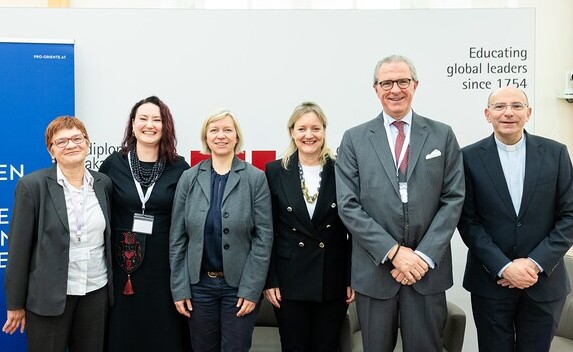EN: A plea for alliances between peacemakers
18. November 2025

Vienna, November 18, 2025 (poi) Religions and churches play an ambivalent role in societies ravaged by war and conflict: they can exacerbate conflicts, but they can also contribute to conflict transformation and reconciliation. Based on this observation, experts presented their contributions on the topic of “The Potential Constructive Role of Religion in Societies Torn by Violence” at a panel discussion at the Diplomatic Academy of Vienna last Friday evening (November 14) at the invitation of PRO ORIENTE and the Academy.
The panelists agreed that greater commitment based on faith is needed to make a credible and lasting impact on reconciliation and peace, as Prof. Mitri Raheb, founder and president of Dar al-Kalima University in Bethlehem, succinctly put it. There was also agreement that conflicts are not only a test of the power of the churches' message, but also an opportunity for change within the churches and religions, according to Tetiana Kalenychenko, sociologist of religion and co-founder of the Ukrainian NGO “Dialogue in Action”, and Ana-Marija Raffai, Croatian theologian and peace activist.
The panel discussion was opened with welcoming remarks by Martina Schubert, Deputy Director of the Diplomatic Academy of Vienna, and Clemens Koja, President of PRO ORIENTE. The event was moderated by Prof. Regina Elsner, an expert on Eastern Churches and ecumenism from Münster University.
In the first presentation, Ana-Marija Raffai discussed the role of churches in the peace process in Croatia, Bosnia-Herzegovina and Serbia. She noted that church institutions, whether Catholic or Orthodox, had not yet played a relevant role in the peace process. Raffai stressed that she misses a clear strategy and visible commitment on the part of the churches towards forgiveness and reconciliation. She emphasized that there could be no peace without reconciliation. The reconciliation process requires courage, self-criticism and the questioning of extreme nationalist rhetoric. Raffai pointed out that true faith is inseparably linked to a willingness to take risks. She said that she draws hope from those initiatives and those individuals and groups within the churches who take this risk. Among other things, she referred to the work of the group “Believers for Peace”, which works with people of different faiths, regardless of their beliefs, to move from an apologetic approach to a dialogical approach.
Tetiana Kalenychenko emphasized the opportunities that dialogue and reconciliation work between churches offers with regard to the transformation of the churches themselves. This was demonstrated by the dialogues between Christian churches in Ukraine initiated by “Dialogue in Action”. She said essentially, it is about creating spaces for encounter on an equal footing – whether for intra-Orthodox, ecumenical or interreligious dialogue. The institutions involved would then become partners in shaping the future after the war. Theology could be a space for imagining what future peace might look like. The work being done today by Ukrainian associations involved in peacemaking not only facilitates encounters between people who sympathize with different political sides, but also enables them to question the meaning of the Russian-Ukrainian war – including the significance of the fact that the majority of those fighting belong to the same religion and the same denomination, namely Orthodox Christianity.
At the beginning of his lecture, Mitri Raheb pointed out that it is not religions that play a role in contributing to peace, but the people who belong to these religions. However, they cannot be reduced to their religious identity alone but also have other aspects of their identity that are equally relevant, Raheb explained. Furthermore, he stated that violence is often viewed as an individual or collective phenomenon, overlooking the structural violence created by systems. Church dialogue and reconciliation work must also take this into account, Raheb stressed. He made it clear that in addition to considering the respective context, a political vision of the desired peace is needed. Regarding the question of which steps on the way there are promising, Raheb emphasized the need for churches and individual believers to move “from reaction to action” instead of just being “followers”.
The panel discussion took place as part of the international ecumenical conference "Healing of Wounded Memories: The Responsibility of Churches to Heal‘ organized by PRO ORIENTE from 13 to 16 November in Vienna. More information on the “Healing of Wounded Memories" project can be found at: https://www.pro-oriente.at/projekte/healing-of-wounded-memories



